Logic, machines
&
sequent calculus
Alexander Gryzlov
Adform
19/12/2018
Lists
data List : Type -> Type where
Nil : List a -- aka []
(::) : a -> List a -> List aList membership
These are natural numbers in disguise!
data Elem : a -> List a -> Type where
Here : Elem x (x::xs)
There : Elem x xs -> Elem x (y::xs)data Nat : Type where
Z : Nat
S : Nat -> NatListS as sets
Subset : List a -> List a -> Type
Subset {a} xs ys =
{x : a} -> Elem x xs -> Elem x ysLambda calculus
A formal rewriting system at the heart of FP
Untyped :
x (variable) λx.M (abstraction) M N (application)
+ β-reduction
(λx.M) N → M[x:=N]
untyped Lambda calculus
DeBrujin indices
Term0 : Term
Term0 = App (Lam $ App (Var Z) (Var Z))
(Lam $ Var Z)
Term1 : Term
Term1 = App (App (Lam $ Var Z) (Lam $ Var Z))
(Lam $ Var Z)
Term2 : Term
Term2 = App (Lam $ Var Z)
(App (Lam $ Var Z) (Lam $ Var Z))data Term = Var Nat
| Lam Term
| App Term Term(λ x. x x) (λ x. x)
((λ x. x) (λ x. x))
(λ x. x)
(λ x. x)
((λ x. x) (λ x. x))

untyped Lambda calculus
1.
(λ x. x x) (λ x. x)
~
(λ x. x) (λ x. x)
~
(λ x. x)
2.
((λ x. x) (λ x. x))
(λ x. x)
~
(λ x. x) (λ x. x)
~
(λ x. x)
3.
(λ x. x)
((λ x. x) (λ x. x))
~
(λ x. x) (λ x. x)
~
(λ x. x)
simply-typed Lambda calculus
data Ty = A | Imp Ty Ty
infix 5 ~>
(~>) : Ty -> Ty -> Ty
(~>) = Imp
data Term : List Ty -> Ty -> Type where
Var : Elem a g -> Term g a
Lam : Term (a::g) b -> Term g (a~>b)
App : Term g (a~>b) -> Term g a -> Term g b
TestTy : Ty
TestTy = A ~> A
-- Term1 not typeable because of self-application!
Term2 : Term [] TestTy
Term2 = App (App (Lam $ Var Here) (Lam $ Var Here)) (Lam $ Var Here)
Term3 : Term [] TestTy
Term3 = App (Lam $ Var Here) (App (Lam $ Var Here) (Lam $ Var Here))
Result : Term [] TestTy
Result = Lam $ Var Here (structural) Proof theory
A branch of logic studying proofs as mathematical objects
Curry-Howard iso:
Theorem ~ Type
Proof ~ Term

Sequent:
For now, let's restrict the RHS to a single formula:

natural deduction
Minimal propositional logic:

Var :
Elem a g ->
Term g aLam :
Term (a::g) b ->
Term g (a~>b)App :
Term g (a~>b) ->
Term g a ->
Term g b
Sequent calculus

VarS :
Elem a g ->
TermS g a
Cut :
TermS g a ->
TermS (a::g) b ->
TermS g b
ImpL :
TermS g a ->
TermS (b::g) c ->
TermS ((a~>b)::g) c
ImpR :
TermS (a::g) b ->
TermS g (a~>b)structural properties
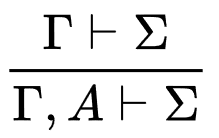
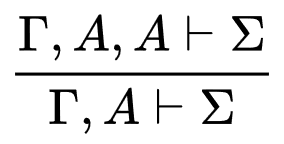
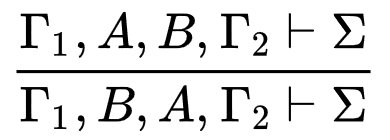
weakening contraction permutation
Gentzen's LJ
data LJ : List Ty -> Ty -> Type where
AxJ : LJ [a] a
CutJ : LJ g a -> LJ (a::g) b -> LJ g b
ImpLJ : LJ g a -> LJ (b::g) c -> LJ ((a~>b)::g) c
ImpRJ : LJ (a::g) b -> LJ g (a~>b)
WSJ : LJ g b -> LJ (a::g) b
CSJ : LJ (a::a::g) b -> LJ (a::g) b
PSJ : LJ (g ++ a::b::d) c -> LJ (g ++ b::a::d) ctwo-sided Sequent calculus
Splits sequents into kinds
and adds activation rules:

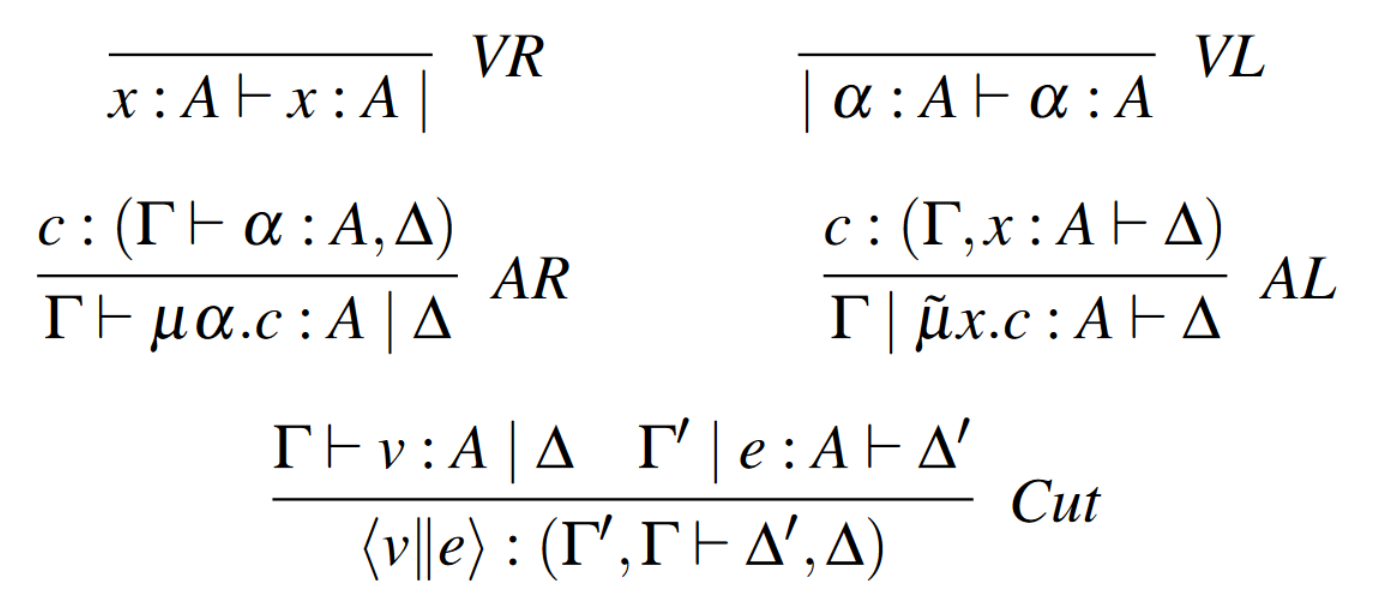
+ structural rules for both sides!
two-sided Sequent calculus
mutual
data Cmd : List Ty -> List Ty -> Type where
C : Term g a d -> CoTerm g a d -> Cmd g d
CWL : ...
CCL : ...
CPL : ...
CWR : ...
data Term : List Ty -> Ty -> List Ty -> Type where
Var : Term [a] a []
Mu : Cmd g (a::d) -> Term g a d
...
data CoTerm : List Ty -> Ty -> List Ty -> Type where
CoVar : CoTerm [] a [a]
Mut : Cmd (a::g) d -> CoTerm g a d
...aka Gentzen's LK
two-sided Sequent calculus
mutual
data Cmd : List Ty -> List Ty -> Type where
C : Term g a d -> CoTerm g a d -> Cmd g d
data Term : List Ty -> Ty -> List Ty -> Type where
Var : Elem a g -> Term g a d
Mu : Cmd g (a::d) -> Term g a d
data CoTerm : List Ty -> Ty -> List Ty -> Type where
CoVar : Elem a d -> CoTerm g a d
Mut : Cmd (a::g) d -> CoTerm g a d
internalise structurals
Subset : List a -> List a -> Type
Subset {a} xs ys = {x : a} -> Elem x xs -> Elem x ys
data IsSubset : List a -> List a -> Type where
Id : IsSubset l l
Cons2 : IsSubset l m -> IsSubset (a::l) (a::m)
shift : IsSubset l m -> Subset l m
shift Id el = el
shift (Cons2 s) Here = Here
shift (Cons2 s) (There el) = There $ shift s el
mutual
shiftCmd : IsSubset g g1 -> IsSubset d d1
-> Cmd g d -> Cmd g1 d1
shiftTerm : IsSubset g g1 -> IsSubset d d1
-> Term g a d -> Term g1 a d1
shiftCoTerm : IsSubset g g1 -> IsSubset d d1
-> CoTerm g a d -> CoTerm g1 a d1 Connectives
E.g., we can add function, tuples & discriminated unions:
data Ty = A | Imp Ty Ty | Prod Ty Ty | Sum Ty Ty
mutual
data Cmd : List Ty -> List Ty -> Type where
C : Term g a d -> CoTerm g a d -> Cmd g d
data Term : List Ty -> Ty -> List Ty -> Type where
Var : Elem a g -> Term g a d
Mu : Cmd g (a::d) -> Term g a d
Lam : Term (a::g) b d -> Term g (Imp a b) d
Pair : Term g a d -> Term g b d -> Term g (Prod a b) d
Inl : Term g a d -> Term g (Sum a b) d
Inr : Term g b d -> Term g (Sum a b) d
data CoTerm : List Ty -> Ty -> List Ty -> Type where
CoVar : Elem a d -> CoTerm g a d
Mut : Cmd (a::g) d -> CoTerm g a d
AppC : Term g a d -> CoTerm g b d -> CoTerm g (Imp a b) d
MatP : Cmd (a::b::g) d -> CoTerm g (Prod a b) d
MatS : Cmd (a::g) d -> Cmd (b::g) d -> CoTerm g (Sum a b) dAbstract machines
Like a virtual machine, but abstract :)
Usually includes closures, stacks & environments
KRivine Abstract machine
Lazy (call by name)
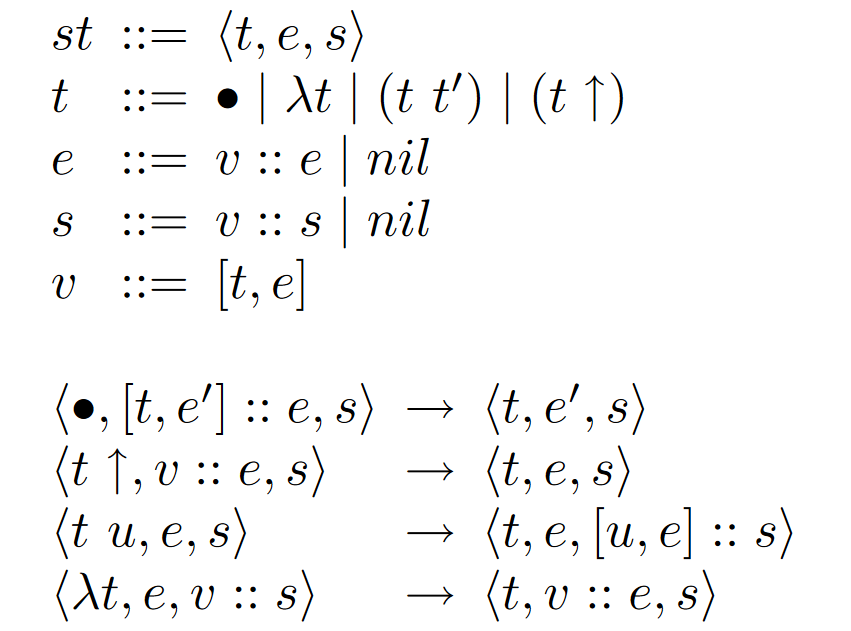
KRivine Abstract machine
mutual
Env : Type
Env = List Clos
data Clos = Cl Term Env
Stack : Type
Stack = List Clos
State : Type
State = (Term, Env, Stack)
step : State -> Maybe State
step (Var Z , Cl t e::_, s) = Just ( t, e, s)
step (Var (S n), _::e, s) = Just (Var n, e, s)
step (Lam t , e, c::s) = Just ( t, c::e, s)
step (App t u , e, s) = Just ( t, e, Cl u e::s)
step _ = Nothingcek
Control + Environment + Kontinuation
Eager (call by value)
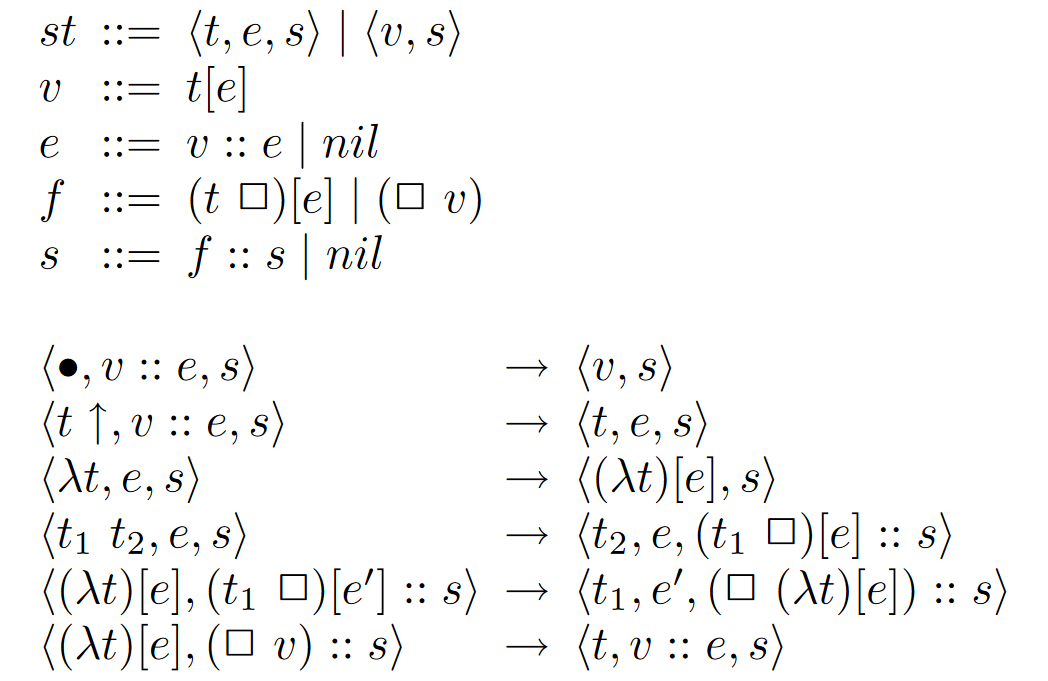
cek
mutual
Env : Type
Env = List Clos
data Clos = Cl Term Env
data Frame = Fun Term Env | Arg Clos
Stack : Type
Stack = List Frame
data State = L Term Env Stack | R Clos Stack
step : State -> Maybe State
step (L (Var Z) (v::_) s ) = Just $ R v s
step (L (Var (S n)) (_::e) s ) = Just $ L (Var n) e s
step (L (Lam t) e s ) = Just $ R (Cl (Lam t) e) s
step (L (App t u) e s ) = Just $ L u e (Fun t e::s)
step (R (Cl (Lam t) e) (Fun t1 e1::s)) = Just $ L t1 e1 (Arg (Cl (Lam t) e)::s)
step (R (Cl (Lam t) e) ( Arg v::s)) = Just $ L t (v::e) s
step _ = NothingDeconstructing
application, lambdas & LET
(λx.t) u → t[x:=u] <λx.t | u·e> → <t[x:=u] | e>
<μ(x·α).c | u·e> → c[x:=u,α:=e]
λx.t === μ(x·α).<t|α>
<t u | e> → <t | u·e>
<μα.c | e> → c[α:=e]
t u === μα.<t|u·α>
let x=t in u === μα.<t|μ~x.<u|α>>
Deconstructing
application & lambdas
mutual
data Cmd : List Ty -> List Ty -> Type where
C : Term g a d -> CoTerm g a d -> Cmd g d
data Term : List Ty -> Ty -> List Ty -> Type where
Var : Elem a g -> Term g a d
Mu : Cmd g (a::d) -> Term g a d
MatC : Cmd (a::g) (b::d) -> Term g (Imp a b) d
data CoTerm : List Ty -> Ty -> List Ty -> Type where
CoVar : Elem a d -> CoTerm g a d
Mut : Cmd (a::g) d -> CoTerm g a d
AppC : Term g a d -> CoTerm g b d -> CoTerm g (Imp a b) d
lam : Term (a::g) b d -> Term g (Imp a b) d
lam t =
MatC $ C (shiftTerm t) (CoVar Here)
app : Term g (Imp a b) d -> Term g a d -> Term g b d
app t u =
Mu $
C (shiftTerm t) (AppC (shiftTerm u) (CoVar Here))
let_ : Term g a d -> Term (a::g) b d -> Term g b d
let_ t u = Mu $ C (shiftTerm t)
(Mut $ C (shiftTerm u) (CoVar Here))call/cc
callcc : Term g (Imp (Imp a b) a) (a::d) -> Term g a d
callcc f =
Mu $ C f
(AppC
(MatC $ C (Var Here) (CoVar $ There Here))
(CoVar Here))
reduction
reduce : Cmd g d -> Maybe (Cmd g d)
reduce (C (Mu c) e ) = Just $ cosubst c e
reduce (C t (Mut c) ) = Just $ subst c t
reduce (C (MatC c) (AppC t e)) = Just $ subst
(cosubst c (shiftCoTerm e))
(shiftTerm t)
reduce _ = Nothing
critical pair!
Dual reduction - LKT

Amounts to lazy evaluation
Dual reduction - LKT
mutual
data Cmd : List Ty -> List Ty -> Type where
C : Term g a d -> CoTerm g a d -> Cmd g d
data Term : List Ty -> Ty -> List Ty -> Type where
Var : Elem a g -> Term g a d
Mu : Cmd g (a::d) -> Term g a d
MatC : Cmd (a::g) (b::d) -> Term g (Imp a b) d
data CoTerm : List Ty -> Ty -> List Ty -> Type where
CoVal : CoValue g a d -> CoTerm g a d
Mut : Cmd (a::g) d -> CoTerm g a d
data CoValue : List Ty -> Ty -> List Ty -> Type where
Empty : CoValue g a d
CoVar : Elem a d -> CoValue g a d
AppC : Term g a d -> CoValue g b d
-> CoValue g (Imp a b) d
Dual reduction - LKQ

Amounts to eager evaluation
Dual reduction - LKQ
mutual
data Cmd : List Ty -> List Ty -> Type where
C : Term g a d -> CoTerm g a d -> Cmd g d
data Term : List Ty -> Ty -> List Ty -> Type where
Val : Value g a d -> Term g a d
Mu : Cmd g (a::d) -> Term g a d
data Value : List Ty -> Ty -> List Ty -> Type where
Var : Elem a g -> Value g a d
MatC : Cmd (a::g) (b::d) -> Value g (Imp a b) d
data CoTerm : List Ty -> Ty -> List Ty -> Type where
CoVar : Elem a d -> CoTerm g a d
Empty : CoTerm g a d
Mut : Cmd (a::g) d -> CoTerm g a d
AppC : Value g a d -> CoTerm g b d
-> CoTerm g (Imp a b) dPolarization

Types

Terms
more polarities
call by need! (true laziness)

effects
reduce : Monad m => Cmd g d -> m (Cmd g d)
...
Adjunction f g => Monad (Compose g f)
???generalizing connectives
Move to
- inductive sums of products and
- coinductive records of functions/matches
Infinite structures become first class
polymorphism

Both universal and existential
dependent types
